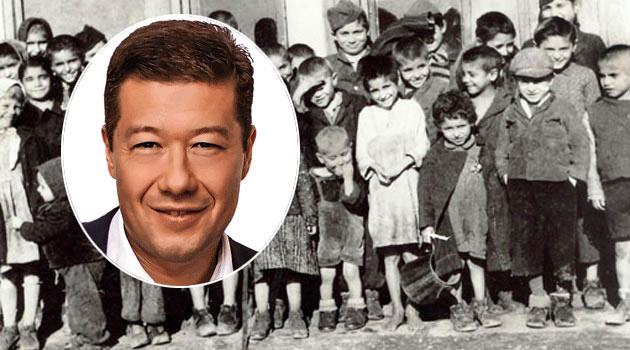Czech MP apologizes for "imprecision", then urges people to read historian who calls the Romani Holocaust a "myth"

The chair of the “Freedom and Direct Democracy” party (SPD), Czech MP Tomio Okamura, who is a vice-chair of the Chamber of Deputies of the Parliament of the Czech Republic, responded through Facebook on 2 February to the Museum of Romani Culture’s request that he apologize for his deceptive remarks about the concentration camp for Romani people at Lety u Písku. In his statement, Okamura apologizes for making imprecise remarks about the fencing of the camp at Lety u Písku, then quotes Jan Rataj, a history professor who alleges that the Protectorate’s “Gypsy Camps” were not concentration camps, and who said in an interview for the tabloid Parlamentní listy that to call them such is to perpetuate a “myth” that is being “politically exploited”.
Rataj’s argumentation has previously been refuted by Dušan Slačka, an historian who works for the Museum of Romani Culture, as follows: “It is an indisputable fact that the internment of Romani people in the so-called ‘Gypsy Camp’ at Lety was in preparation for the ‘Final Solution to the Gypsy Question’ that had been prepared for many years by the Nazi high command and by pseudo-scientists ‘researching race’. The Lety ‘Gypsy Camp’ fulfilled the function of concentrating the Romani people of Bohemia, who were then sent from there to the extermination camp of Auschwitz II-Birkenau. At Lety the Romani prisoners were supervised by Protectorate security forces whose members frequently abused and beat them. As a consequence of substandard diet and hygiene conditions, a significant death rate happened there that exceeded, for example, the death rate of the concentration camp at Dachau percentage-wise. According to Professor Rataj’s narrow definition, Lety allegedly was not a concentration camp. According to the facts presented above, however, it is possible to call the so-called ‘Gypsy Camp’ at Lety by Písek a concentration camp, without exaggeration.”
“The Holocaust of the Bohemian and Moravian Roma remains, to a significant degree, a so-called ‘unknown’ Holocaust here – even though today this is rather due to society’s lack of interest in it than to a lack of accessible information sources about it. From such a perspective, therefore, it seems that Lety could not have been a ‘concentration camp’ – and what’s more, according to Professor Rataj, it is not possible to compare the suffering of the Roma interned at Lety with the suffering of the Czech Resistance fighters in the Nazi concentration camps. Here it is interesting to note that the term ‘concentration camp’ is also commonly used in the Czech Republic, for example, to refer to Terezín. According to the strict criteria used by Professor Rataj in this interview, however, even Terezín should not be referred to as a ‘concentration camp’,” Slačka wrote.
In his remarks to the DVTV channel last month, Okamura said his opinions were based on a book that alleged the camp at Lety had not been fenced and that people had been free to come and go from it – and he has now said he believes the reactions prompted by his remarks are “hysterical”. “This is an intentional attack by persons who are directed and financially supported by the ‘tunneler’ Bakala, specifically, DVTV and those like them, such as the political nonprofit Open Society Foudations [sic] of George Soros. You should decidedly read other details and facts about the camp at Lety in the book ‘Historians and the Case of Lety’ [Historikové a kauza Lety] published by the Historical Institute of the Academy of Sciences of the Czech Republic and the interview there with the historian Prof. PhDr. Jana Rafaje [sic], Csc.,” Okamura has posted to Facebook.
In that interview, Rataj makes this statement: “Instead of the political exploitation of the myth about the Romani Holocaust in the prison labor camp at Lety and the labelling of opinions that are different, I recommend returning our attention to and directing financial flows to measures combating the actual decline of a large part of the gypsy population of the Czech Republic.” The monograph in question was published almost 20 years ago, in 1999; the term “cikán” (“gypsy”) is considered pejorative by many Romani people.